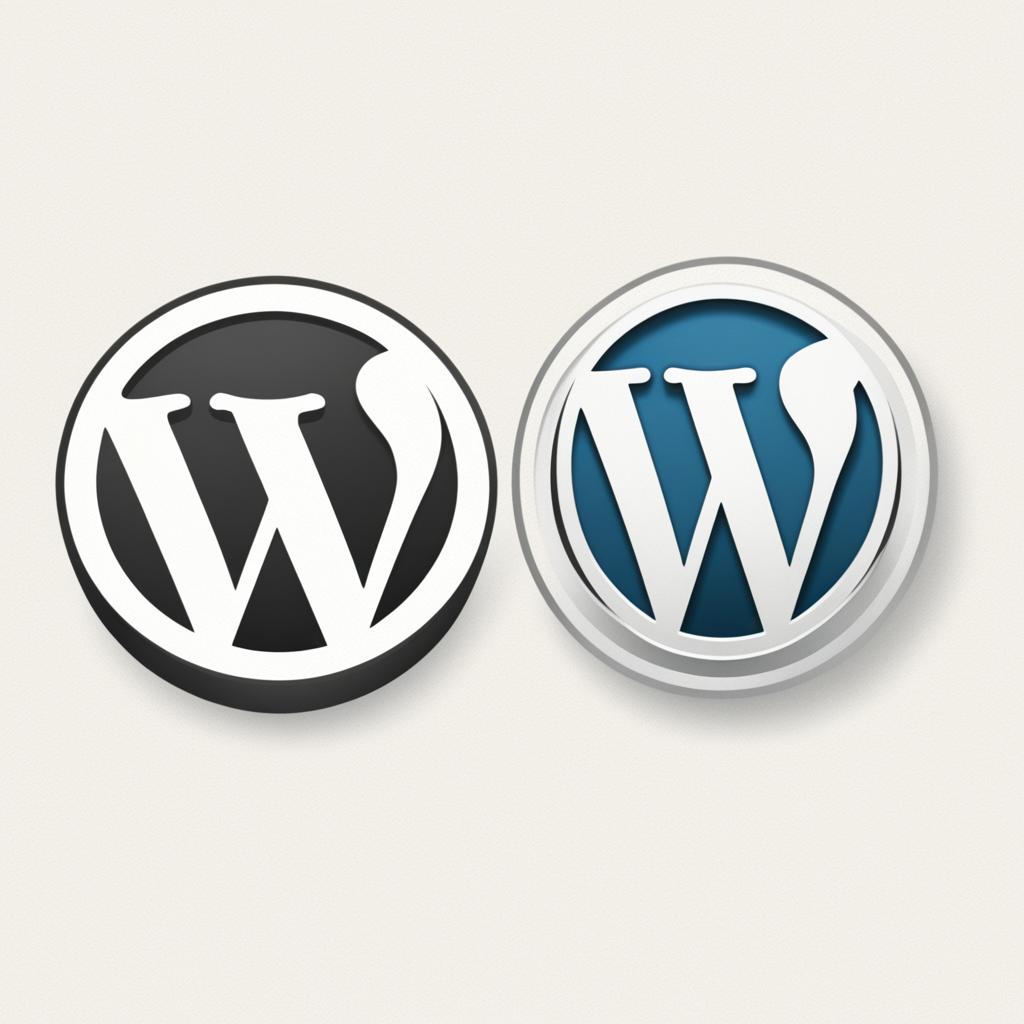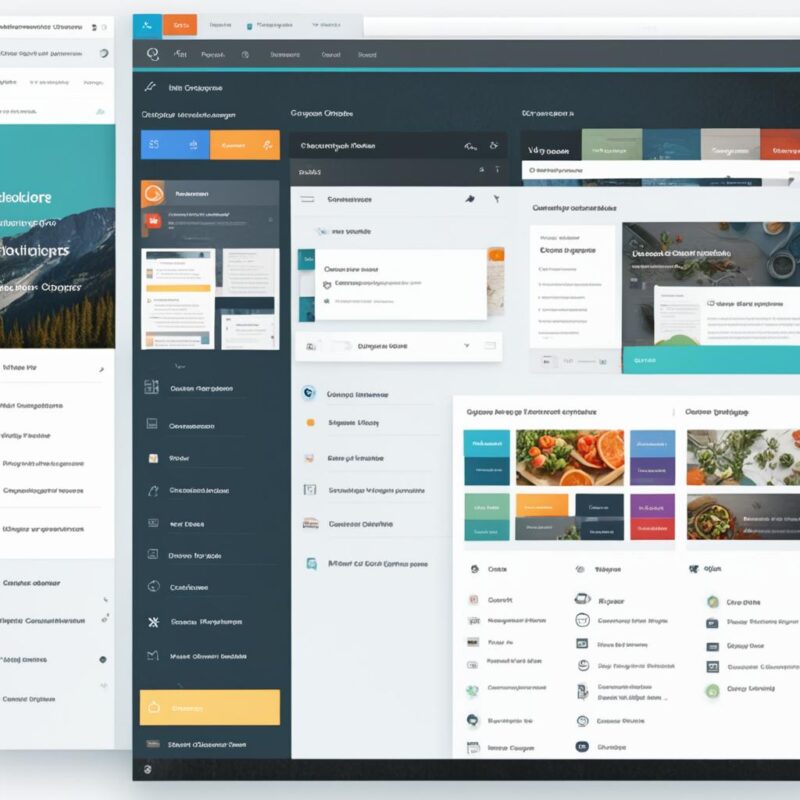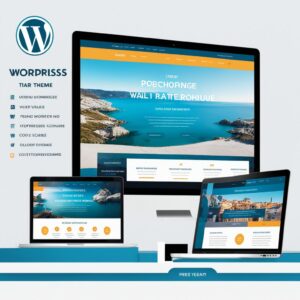
Blogger vs WordPress: Best Platform for Blogs?
Are you looking to start a blog but can’t decide between Blogger vs WordPress? The choice between these two leading blog platforms can be challenging, as both have their own set of advantages and disadvantages. So, which one is the best option for creating a blog? Let’s dive in and compare the features, customization options, and integrations of Blogger and WordPress to help you make an informed decision.
Table of contents
Key Takeaways:
- Blogger and WordPress are popular blog platforms with their own strengths and limitations.
- WordPress offers extensive customization options, while Blogger is more user-friendly and straightforward for content creation.
- WordPress provides better integration with third-party services and has a larger community for support.
- The choice between Blogger and WordPress depends on your specific needs and goals for your blog.
Who Are They For?
When it comes to choosing the best blogging platform, it’s important to understand who each platform is designed for. Let’s take a closer look at who Blogger vs WordPress are catered to.
WordPress
WordPress.com: WordPress.com is a hosted platform that provides users with a free option to start their blogs. It’s ideal for bloggers who are looking for a user-friendly platform and don’t want to deal with the technical aspects of website hosting. WordPress.com is suitable for a wide range of websites, including e-commerce sites and membership sites.
WordPress.org: On the other hand, WordPress.org is a self-hosted platform that offers more freedom and control. It is recommended for bloggers or businesses looking for a highly customizable and flexible platform. With WordPress.org, users have full control over their website’s design, functionality, and hosting options.
Blogger
Blogger is a free blogging service from Google, primarily focused on content creation. It’s designed for bloggers who want a simple and straightforward platform to create and publish content easily. Blogger is a great choice for individuals who prioritize the simplicity of content creation and prefer not to deal with complex customization options.
Now that we have a better understanding of who each platform is for, let’s dive deeper into the specific features and functionalities provided by Blogger and WordPress in the following sections.
| Blogger | WordPress |
|---|---|
| Free platform | Both free and self-hosted options available |
| Simplified content creation | Extensive customization options |
| Basic themes and gadgets for customization | Vast library of themes and plugins |
| More limited integration options | Wide range of integrations with third-party services |
| Less advanced features for SEO optimization | Advanced SEO optimization options |
| Limited support compared to WordPress | Large and supportive community |
Writing Comparison
When it comes to writing blog posts, both Blogger and WordPress offer distinct features and functionalities.
WordPress provides the Gutenberg block editor, a powerful tool that allows for easy customization and styling of individual elements. This editor offers a smooth user experience and access to various blocks designed for different types of content. The Gutenberg block editor empowers bloggers by enabling them to create visually appealing and engaging posts.
On the other hand, Blogger offers a traditional WYSIWYG (What You See Is What You Get) editor. While it may not have as many customization options as WordPress, this editor is simple and intuitive, making it efficient for pure blogging and content creation. It allows bloggers to focus solely on crafting their ideas and stories.
Blogger’s WYSIWYG editor provides a straightforward experience for bloggers who prefer a simple and intuitive writing environment.
Overall, WordPress’s Gutenberg block editor caters to bloggers seeking higher levels of customization, design flexibility, and advanced formatting options. In contrast, Blogger’s WYSIWYG editor serves bloggers who value ease of use and prefer a more streamlined writing process.
Comparison of Writing Features:
| Features | WordPress | Blogger |
|---|---|---|
| Editor | Gutenberg block editor | WYSIWYG editor |
| Customization | Extensive customization options | Limited customization options |
| Blocks | Various blocks for different types of content | N/A |
As shown in the comparison table above, WordPress offers a more diverse range of features tailored to meet the needs of bloggers who require enhanced customization and design control. However, Blogger’s simpler editor provides a user-friendly writing experience for bloggers who prioritize content creation over advanced customization.

With this understanding of the writing capabilities of both platforms, let’s move on to explore the customization options in the next section.
Customization Options
When it comes to customization, WordPress vs Blogger offer different levels of flexibility for users to personalize their blogs.
WordPress, with its vast library of themes and plugins, provides extensive customization options. Users have full control over the design and functionality of their blogs, allowing them to create a unique and tailored online presence. Whether you’re looking for a sleek and modern layout or a more traditional and elegant design, WordPress has a wide range of options to choose from. With its intuitive customization interface, you can easily modify colors, fonts, layouts, and more to match your brand or personal style.

On the other hand, Blogger has more limited customization options compared to WordPress. It offers a smaller selection of themes and gadgets for basic customization. While Blogger allows users to make some changes through HTML editing, it does not match the flexibility and range of options provided by WordPress. As a result, bloggers may find it more challenging to create a unique and visually appealing blog using Blogger’s limited customization features.
Here’s a breakdown of the customization options offered by WordPress vs Blogger:
| Platform | Customization Options |
|---|---|
| WordPress |
|
| Blogger |
|
As evident from the table, WordPress offers a more comprehensive set of customization options, allowing users to craft a blog that reflects their unique style and requirements. While Blogger can still be functional for those looking for a simpler approach, its limited customization options may hinder users who seek a more personalized and visually appealing blog.
Integrations and Support
When it comes to integrations with third-party services and plugins, WordPress takes the lead in comparison to Blogger. WordPress offers a wide range of options to connect your blog with external services such as CRMs, advertising networks, and analytics tools. Its extensive plugin library allows you to enhance your blog’s functionality and optimize it for SEO purposes. This makes WordPress the go-to platform for those seeking advanced integrations and SEO optimization.
Additionally, WordPress boasts a large and supportive community that provides valuable resources and tutorials. Whether you need assistance with technical issues or want to stay updated with the latest trends and features, the WordPress community has got you covered. Their active forums and vibrant developer ecosystem ensure that you receive the support you need to make the most out of your WordPress blog.
“WordPress’s integration capabilities and community support allow bloggers to seamlessly connect their blogs with external services and enhance their website’s performance and functionality.”
On the other hand, Blogger has more limited integration options compared to WordPress. Although it offers basic features for content creation, it lacks the advanced integrations and support that WordPress provides. Blogger focuses primarily on content creation, making it a suitable choice for those who prioritize simplicity and ease of use over advanced integrations and SEO optimization.
Furthermore, Blogger’s support options are more limited compared to WordPress. While both platforms offer support documentation, WordPress has a wider range of resources available. From comprehensive guides to video tutorials, WordPress ensures that users can find solutions to their queries and overcome any challenges they may face in the blogging journey.
Overall, WordPress outshines Blogger when it comes to integrations with external services, customization options, and support. Its vast community, extensive plugin library, and advanced features make it the preferred choice for bloggers looking to maximize their blog’s potential.
Conclusion
In conclusion, when comparing Blogger vs WordPress, it’s important to consider your specific needs and goals for your blog. Blogger offers a simple and user-friendly platform that is ideal for individuals who prioritize content creation and want an easy way to publish their work. However, it lacks the extensive customization options and advanced features that WordPress provides.
WordPress, on the other hand, stands out as the best choice for serious bloggers and businesses. It offers a wide range of customization options, allowing you to fully control the design and functionality of your blog. With its vast library of themes and plugins, you can create a unique and professional website tailored to your brand. Additionally, WordPress excels in integrations and has a supportive community, making it easier to connect with third-party services and find resources and tutorials for further assistance.
When it comes to deciding the best blogging platform, it’s important to weigh the pros and cons of Blogger and WordPress. While Blogger is a suitable option for beginners or those who prioritize simplicity, WordPress offers the versatility, customization, and advanced features needed for a successful blog in today’s competitive digital landscape. Depending on your specific requirements, WordPress is the superior choice as the best blogging platform.
FAQ
Both WordPress and Blogger have their own strengths and weaknesses. It ultimately depends on your specific needs and goals.
Yes, WordPress is suitable for a wide range of websites, including e-commerce sites and membership sites. It offers more freedom and control with its self-hosted platform, WordPress.org.
Blogger is a simple and user-friendly platform for content creation and blogging. It offers a straightforward interface and intuitive WYSIWYG editor.
Yes, WordPress provides extensive customization options with its vast library of themes and plugins. It allows users to fully control the design and functionality of their blogs.
Yes, Blogger does offer some customization options with its limited selection of themes and gadgets. Users can also make customizations through HTML editing.
WordPress has better integration options with third-party services. It offers a wide range of options for connecting to external services like CRMs, advertising networks, and analytics tools.
Yes, support for Blogger is more limited compared to WordPress. WordPress has a large and supportive community, with plenty of resources and tutorials available.
More:
- LiteSpeed WordPress: Enhance Your Site’s Speed
- Top Free WordPress Themes 2023 | Best Picks
- Understanding CDN WordPress Integration
- How to Install WordPress on CyberPanel with LiteSpeed Cache and Create Packages, Users, and Websites
- Effective SEO Optimization Strategies for Growth








Leave a Reply
You must be logged in to post a comment.